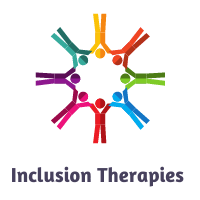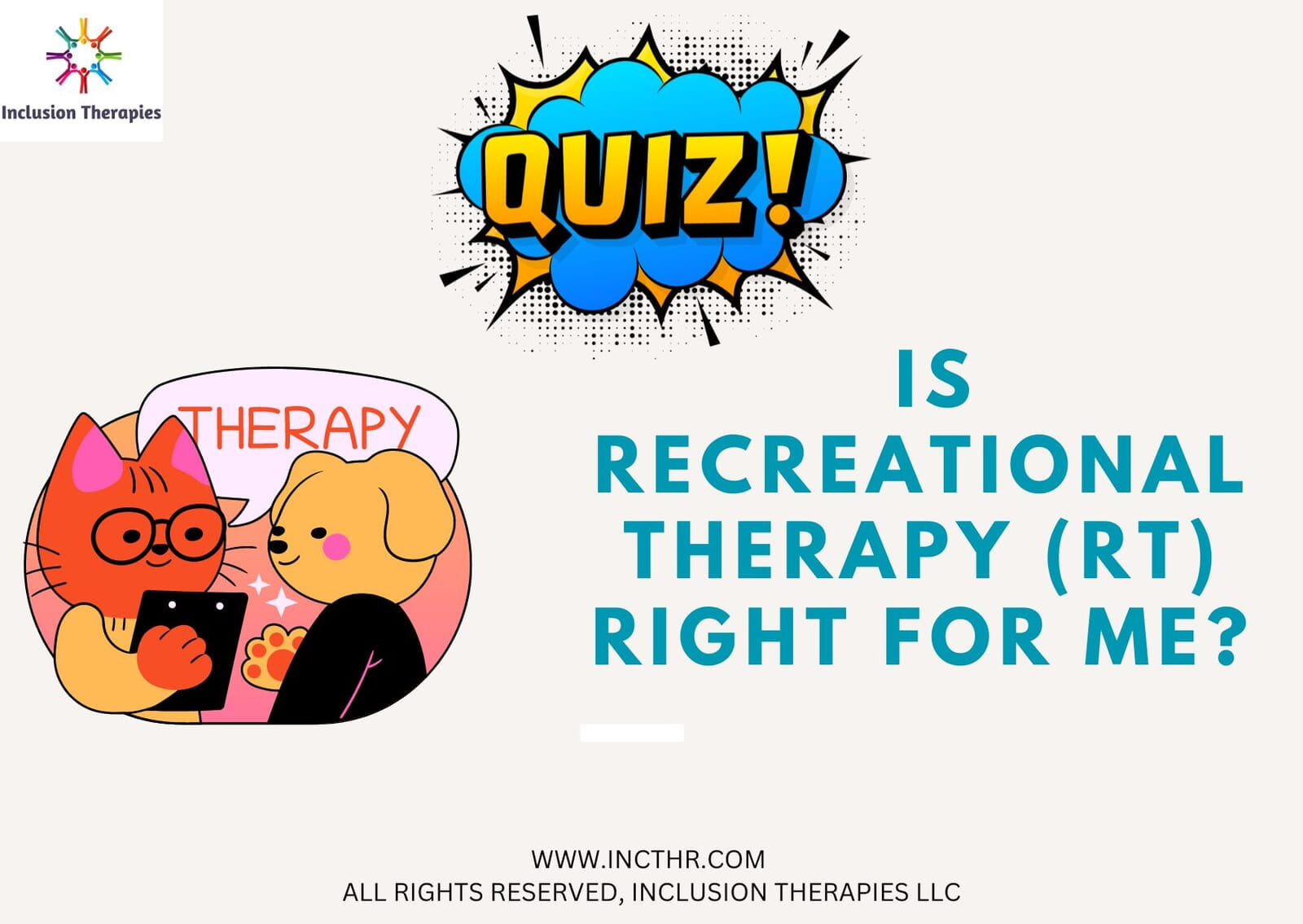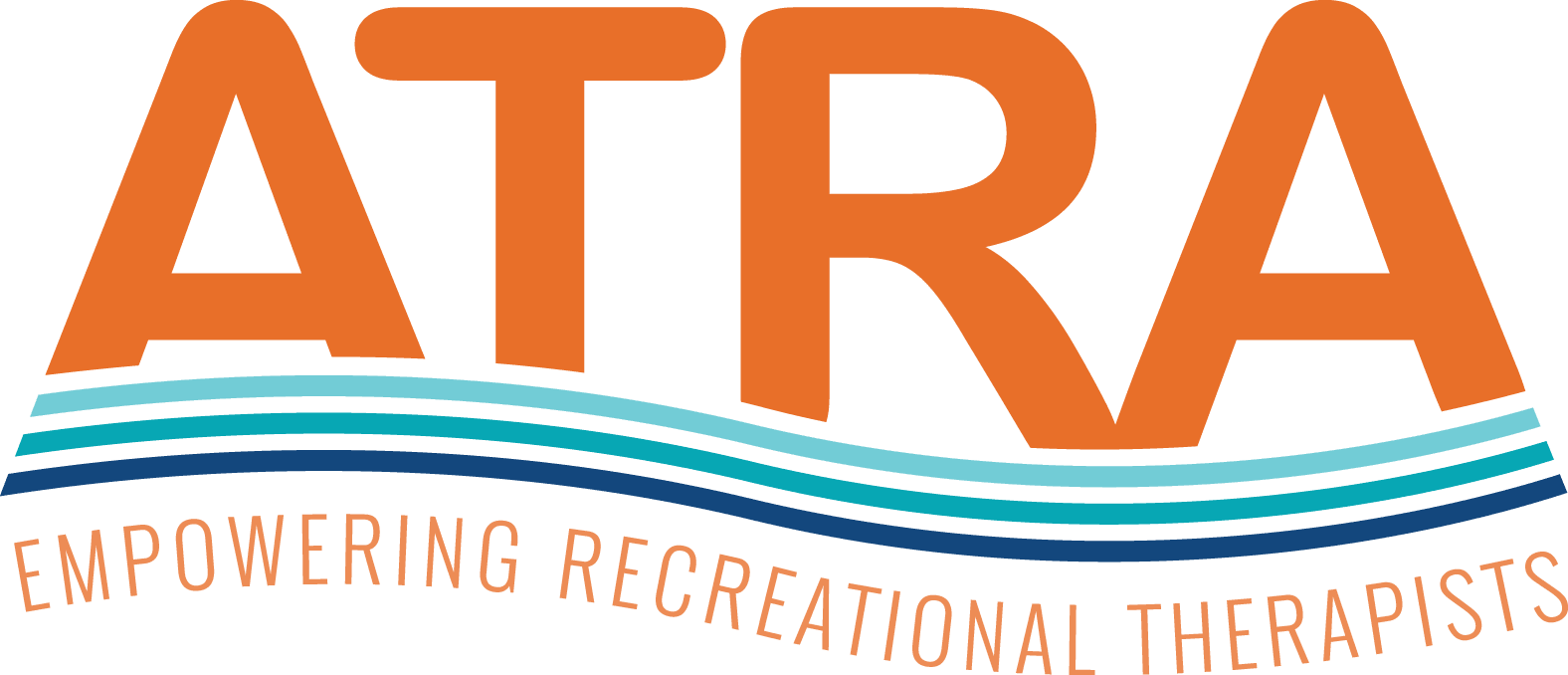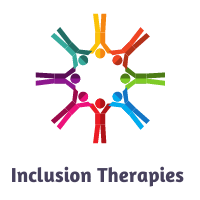Our Treatment Process
At Inclusion Therapies, Recreational Therapy (RT) is a therapeutic process with defined outcomes.
There is a beginning (Initial Health Assessment, Diagnosis and Treatment Plan),a middle (therapy sessions)
Clients are in control of the process at all times and collaborate with their therapists to ensure their individual optimal treatment outcomes.
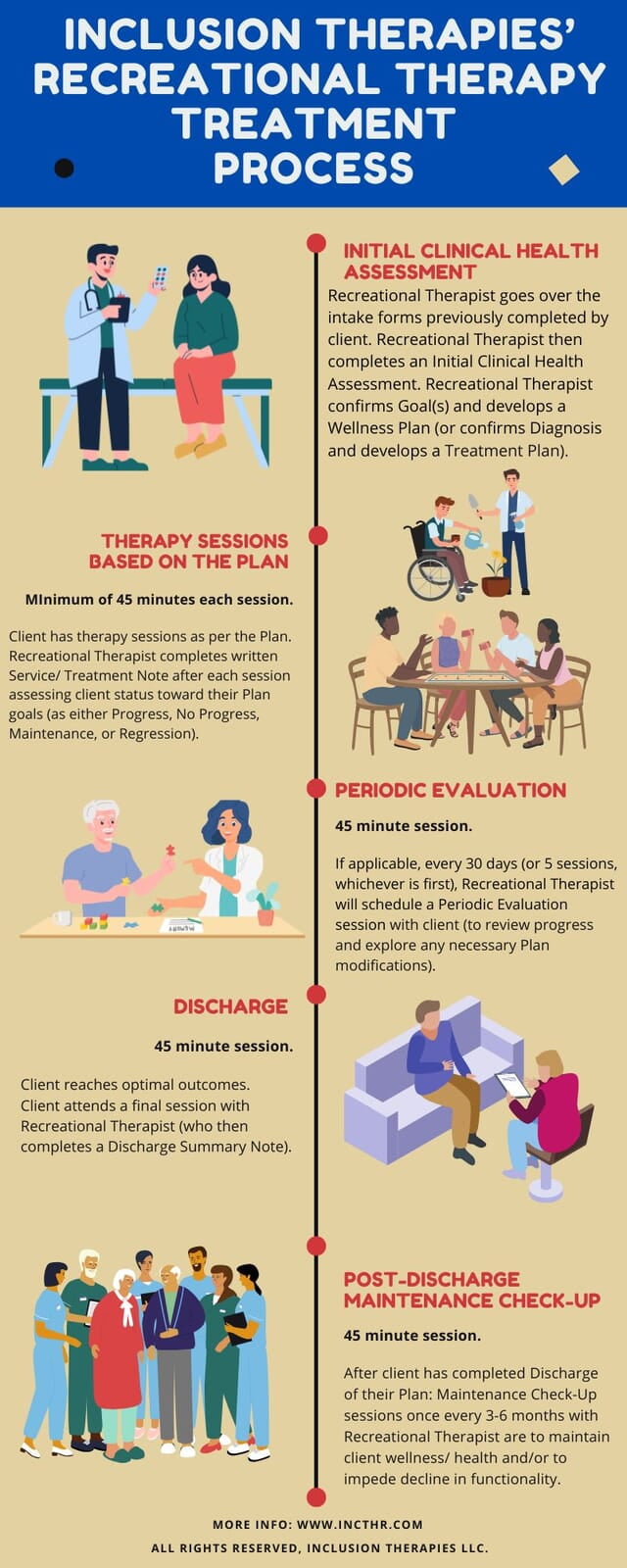
Recreation Therapists construct appropriate and evidence-based recreation therapy interventions for treating patients with complex medical or mental health issues such as Polytrauma, Traumatic Brain Injury (TBI); Post-Traumatic Stress Disorder (PTSD); Spinal Cord Injury (SCI); Substance Use Disorder/ Addictions; Serious Mental Illness (SMI); and Hospice/Palliative Care"
- U.S. Department of Veterans Affairs
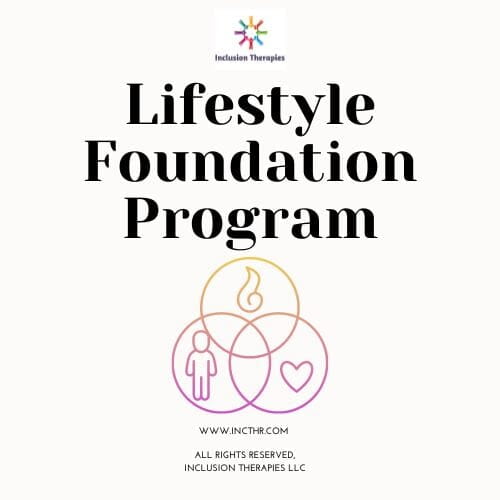
Our Lifestyle Foundation Program
Recreational Therapy is based on treating health and wellness conditions by integrating the five domains of life (Cognitive, Emotional, Physical, Social and Spiritual).
Each Lifestyle Foundation Program cycle includes all five domains and is two months in duration.
Clients average 1 -3 cycles to attain their goals (2-6 months to complete program). Our monthly membership fee is $399.
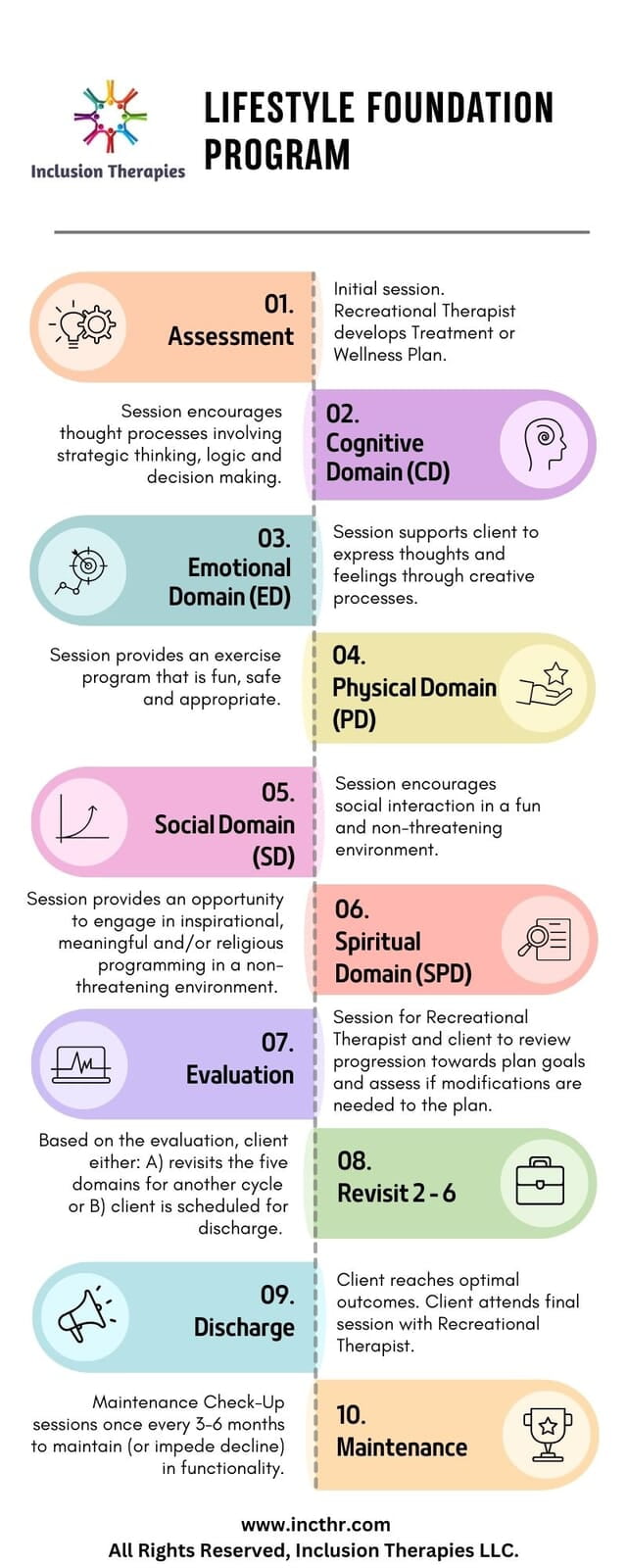
FAQ: Lifestyle Foundation Program
We have developed our Lifestyle Foundation Program to address all five domains with a structured treatment method based on these universal goals:
A. Functional Intervention (FI): To provide services that will improve (or maintain) clients' cognition, physical fitness, emotional control, social skills and sense of meaning.
B. Leisure Education (LE): To provide services to help clients better understand the relationships between leisure, health and their quality of life.
C. Leisure Activity Skills (LAR): To provide opportunities for clients to freely engage in healthy leisure activities.
Our Recreational Therapists treat health and wellness conditions in the Flourishing Through Leisure Model by focusing on
1) Psychological/emotional - Psychological and emotional strengths help us perceive the world around us, and feel and regulate a range of emotions.
2) Cognitive - Cognitive strengths are those that help us think and learn.
3) Social - Social strengths are those that help us relate to others and belong to valued social groups.
4) Physical - Physical strengths are those that help the participant “act” and “do” in their daily life with no barriers.
5) Spiritual - Spirituality is defined as having strong and coherent beliefs about the higher purpose and meaning of life (Seligman, 2002).
Each cycle of the program incorporates an individual focus on each domain.
- After the first session assessment (see 1 on graphic), each therapy session will focus on one of the domains. Since there are five domains, there will be five domain-centric sessions each cycle (one devoted to each domain).
- After completing at least one session in each domain (see 2-6 on graphic), you and the Recreational Therapist will meet to review your progress.
- This is a Periodic Evaluation session (see 7 on graphic).
- Together, you and the Recreational Therapist will decide if the Plan needs to change, if you would benefit from revisiting another cycle through the five domains (see 8 on graphic) or if you will be scheduled for discharge.
- When you reach your goals (optimal outcomes), the Discharge session (see 9 on graphic) is the final session for review of how the goals were reached.
- The maintenance schedule (see 10 on graphic) is completed (with single sessions every 3-6 months) to help you retain (or prevent decline) of what you accomplished (e.g., functionality).
Most clients will reach their optimal goals within 1-3 cycles.
It takes two months to complete one cycle. Month 1 = 4 sessions and Month 2 = 4 sessions.
| Session | Treatment | Session Domain Focus | Included in Monthly Membership? |
|---|---|---|---|
| 1 | Assessment | N/A | Yes - Month 1 |
| 2 | N/A | Cognitive | Yes - Month 1 |
| 3 | N/A | Emotional | Yes - Month 1 |
| 4 | N/A | Physical | Yes - Month 1 |
| 5 | N/A | Social | Yes - Month 2 |
| 6 | N/A | Spiritual | Yes - Month 2 |
| 7 | Evaluation | N/A | Yes - Month 2 |
| 8 | Revisit Cycle = NO | N/A | N/A |
| 9 | Discharge | N/A | Yes - Month 2 |
| 10 | Maintenance | N/A | No - Single Session in 3-6 months |
It takes two months to complete one cycle. Month 1 = 4 sessions and Month 2 = 4 sessions.
Each month is $399.
Total cost for each cycle is 2 months x $399 = $798.
Session Maintenance Check-Up (3-6 months after program completion) single session is $99.75 (for 45 minute session)
If they hadn't reached their goals.
For example, imagine a client had a goal to gain skills to effectively manage their anxiety when they were at home and at work.
Imagine that they experienced anxiety crisis events an average of 7 times each week at home and 7 times each week at work (what someone is experiencing prior to starting treatment, known as a baseline).
In the first session Assessment, client identified their preferred leisure interests as electronic gaming, playing game of dominoes, nature (Ecotherapy) and listening to music.
Client then completed a Cognition domain focused session and an Emotion domain focused session with the activity of playing online game Fortnite. A Physical domain focused session with an Ecotherapy (Nature walk, birdwatching) activity, a Social domain focused session with an activity of playing dominoes and a Spiritual domain focused session listening to meaningful music.
At the end of the first cycle, the client has progressed from one anxiety crisis event per day (7) at home to one anxiety crisis event per week (1).
They have reached their goal for home.
Yet, they are still experiencing one anxiety crisis event per day at work.
They would choose to revisit another cycle to focus on gaining the skills to manage anxiety in the work environment.
From a 2021 study on how clients (in Norway) feel about mental health therapy ending, clients "identified four experiential trajectories through therapy[...][,]
Trajectory A: It is ok to stop here—Not wanting more therapy;
Trajectory C: Being on one’s own too early—Economic obstacles hindering the continuation of therapy; and
Trajectory D: I need more than this—Securing continued therapy[.]"
- Stige, S. H., Binder, P.-E., Stiegler, J. R., Schanche, E., Hummelslund, D. A., & Hjeltnes, A. (2021). Clients’ Perspective on Predetermined Time Limits for Therapy in the Context of the Norwegian Welfare System. Sage Open, 11(2). https://doi.org/10.1177/21582440211009506
Not recommended as that wouldn't meet the standards of the allied health field of Recreational Therapy.
We structured the Lifestyle Foundation Progam as a holistic process to address the multiple domains as per the purpose of Recreational Therapy.
For focus on a single domain, other medical and health care fields would be appropriate.
- For example, for Cognitive Domain, Psychology includes Cognitive Therapy (CT) with "the goal of interrupting disturbing behavioral and/or thought patterns that have been interfering in daily life."
- For Emotional Domain, Psychology includes "Emotion-focused therapy (EFT) can be defined as the practice of therapy informed by an understanding of the role of emotion in psychotherapeutic change."
- For Physical Domain (without leisure activity purpose) the aim of Physical Therapy is "to relieve pain, help you move better or strengthen weakened muscles."
- For Social Domain (without leisure activity purpose), Applied Behavior Analysis therapy "is to improve social skills by using interventions that are based on principles of learning theory."
- For Spiritual Domain, Spiritual Therapy focuses on faith.
- For domains related to daily activity (without leisure activity purpose), Occupational Therapy is to "use occupation and meaningful Activities [of Daily Living (ADLs)] with specific goals to help people of all ages prevent, lessen, or adapt to disabilities."
“Therapeutic recreation is a holistic process that purposefully uses recreation and experiential interventions to bring about a change-either social, emotional, intellectual, physical, or spiritual-in an effort to maintain and improve health status, functional capacities, and quality of life.” (page 5, Therapeutic Recreation: A Practical Approach, Fifth Edition By Marcia Jean Carter, Glen E. Van Andel)
SAMPLE COGNITIVE SESSION
Domain Focus
| Session Notes
|
| |
Cognitive | Who? Client and RT – Private Session.
What? Cognitive Domain session.
When? Second session in Lifestyle Foundation Program (after first session Assessment).
Where? Online in the video game Fortnite.
Why? Goal to gain skills to effectively manage their anxiety when they were at home and at work. Baseline anxiety crisis event 7 times a week at home and work. In the first session assessment, client identified their preferred leisure interests as electronic gaming, playing game of dominoes, nature (Ecotherapy) and listening to music.
How? Client led a two-person team (duo) in the game with the Recreational Therapist (RT) as the other player. At the start of all sessions, client are asked a short survey to rate their overall life. At the start of the game, client said, “Victory Royale [first place finish] on the way!” The team finished 5th out of 100 teams.
RT had private communication with client throughout the game and discussed their game strategy decisions, how they reacted to other players (and events) and how they processed their emotional regulation when they did not achieve a first-place finish.
Client discussed the most recent anxiety crisis events at home (a disagreement with their spouse over laundry). Client said their spouse was "lazy" for washing dirty laundry. When RT asked client if they washed laundry more than their spouse, client said, "No. I'm tired and overwhelmed about work." RT discussed that when a person thinks (cognitive) that the reason another person does something (an outcome) is because (attribution) of who they internally are (character) rather than what they are experiencing outside of themselves (external factors); that is a cognitive bias or trap, known as fundamental attribution error. RT observed that an example of this error was when client thought their spouse was "lazy" when they thought they were "tired and overwhelmed." RT asked client to consider how that bias may be hurting their relationship (and even client themselves with conflict and increased anxiety). RT discussed options for different thought patterns in the future. RT asked client to identify other potential causes for their spouse to behave as they do, that are not based on internal character. Client shared options including, “because they're still not feeling well from surgery last month,” “because they're worried about their grandfather who has cancer,” and “because they have a big deadline coming up at work.” The session time then ended. At the end of all domain-focused sessions, clients are asked a short survey to measure their rating of the session itself.
After each domain-focused session, RT staff complete a Session Note describing the events and whether client evidenced Progress, Maintenance, No Progress, or Regression towards their goals. As this was the first treatment session (after assessment), it was rated Maintenance.
|
Who?
Client and RT – Private Session.
What?
Emotional Domain session.
When?
Third session in Lifestyle Foundation Program.
Where?
Online in the video game Fortnite.
Why?
Goal to gain skills to effectively manage their anxiety when they were at home and at work. Baseline anxiety crisis event 7 times a week at home and work. In the first session assessment, client identified their preferred leisure interests as electronic gaming, playing game of dominoes, nature (Ecotherapy) and listening to music.
How?
Emotional Domain session was online in video game Fortnite. At the start of all sessions, client are asked a short survey to rate their overall life. RT led a two-person team (duo) in the game with client. RT made strategy decisions and observed and responded to client's emotional responses. RT is not an expert video game player and confirmed that with client prior to the start of the game.
When RT was discussing options for game strategy, client said, "You are trying to make me look stupid!" RT responded that expectations of what other people should do or will do is not productive as client is unable to control other people. RT asked client to focus on their own breathing rate and consider using slower breaths to lower their sympathetic nervous system response (biofeedback). Client discussed a recent anxiety crisis event at work when their "idiot co-worker" made a decision that client disagreed with. Client shared that playing the game with RT as leader reminded them of the workplace event with their co-worker. Client said their co-worker "only goes to the office because they're obsessed with trying to ruin my career." RT discussed the ability of client to tolerate when they don't get what they want and/or when other people make decisions they react to with distress (distress tolerance). Their team finished 45th out of 100 teams. At the end of the session, client apologized to RT and said, "Sorry for saying you made me look stupid. I felt embarrassed and was anxious that other players were laughing at me."
RT accepted client's apology. RT asked client to describe what it feels like for them to experience feeling the physical effects of increasing anxiety. Client talked about talking action when they felt anxious like insulting people or putting themselves down. Client discussed that they then felt additional stress and shame of having done something hurtful or "bad." RT asked client to explore why they continue that pattern of behavior (anxiety cycle) when it is not getting them what they want in life.
RT explored the option of client asking themselves whether an issue is real or imagined (reality check). For example, is it more likely reality that the only reason their co-worker is at their job is to “ruin” client’s career? Or, is it more likely that other reasons including salary or professional satisfaction may motivate them to go to the office. When RT asked client how long their co-worker had worked in their office, client replied, “Forever, like 20 years.” RT asked client how long they had worked in their office and client said, “Almost two years.” RT asked client to consider that if the co-worker had been at the office for two decades (about 18 years before client came to work there), isn’t it more likely that other reasons motivate the co-worker? Client replied, “Duh, obviously they weren’t obsessed with me before I started at the office. I guess maybe money is a bigger reason. Oh, and they won some award for being the best salesperson for a few years. I still think they don’t like me.” The session time then ended. At the end of all domain-focused sessions, clients are asked a short survey to measure their rating of the session itself.
After each domain-focused session, RT staff complete a Session Note describing the events and whether client evidenced Progress, Maintenance, No Progress, or Regression towards their goals. Using the prior session as a baseline, this session was rated Regression evidenced by client reporting recent anxiety events at work and attributing RT’s poor video game skills to a desire to hurt or humiliate client instead of due to the therapist's lack of expertise in the video game. Client also insulted a co-worker and attributed the co-worker's behavior solely to a desire to hurt or ruin client (when co-worker had worked at the office longer than client and received awards for performance in the past). RT observed that client accusing people of harmful intentions was behavior consistent with paranoia.
Who?
Client and RT – Private Session.
What?
Physical Domain session.
When?
Fourth session in Lifestyle Foundation Program.
Where?
In-Person at Lake Travis center.
Why?
Goal to gain skills to effectively manage their anxiety when they were at home and at work. Baseline anxiety crisis event 7 times a week at home and work. In the first session assessment, client identified their preferred leisure interests as electronic gaming, playing game of dominoes, nature (Ecotherapy) and listening to music.
How?
Physical Domain session was outdoors at Lake Travis center. At the start of all sessions, client are asked a short survey to rate their overall life. At the start of each in-person session, vital signs are taken for each client.
Client and RT walked outside the center, looked at Lake Travis and observed birds (with binoculars). While outside with RT, client discussed events at work that led to their most recent anxiety crisis event. Client disclosed that they deleted a work assignment out of fear that "it wasn't good enough." Client also shared that they didn't return a message from their supervisor because they said they were "scared they were going to be fired."
RT explored with client the concepts of how what we think, how we behave and how other people make us feel are related (known as Cognitive Behavioral Therapy). RT role-played scenarios as their supervisor to enable client to explore options for the requested interaction. While role-playing, client suggested that their supervisor may have left them a message to discuss a new project or to review information ahead of the all staff meeting next month. The role-paying was to support client in expansion of their perceptions beyond the worry and fear that the message from their supervisor meant something bad was going to happen to client (catastrophizing).
RT asked client what happened the last time their supervisor sent them a message. Client replied, “Oh, that was last quarter. It was to tell me I had the best sales numbers in our department. But, I know that this time it is to fire me.” RT asked client what they would do if they were fired. Client said, “It would be a disaster! Everyone would think I’m a loser.” RT asked what impact the loss of income from their job would have in their life. Client said, “I have two years of salary saved. I would be okay for at least two years, but I would need to find another job in that time.” RT explored with client whether it was more likely real or imaginary that they would not be able to find any work in two years. Client said, “I am sure I’d get something. Recruiters contact me constantly. I just don’t know if I’d like a new job as much as this one.”
When RT asked client what evidence there was to support the conclusion that their supervisor was going to fire them, client said, “You must not have a mother like mine. I am told everyday what a failure I am. I know that I will never be good enough, even if I got lucky with that sales award last quarter.” RT explored the concept of self that client formed in the past and options to change it (if desired). The session time then ended. At the end of all domain-focused sessions, clients are asked a short survey to measure their rating of the session itself.
After each domain-focused session, RT staff complete a Session Note describing the events and whether client evidenced Progress, Maintenance, No Progress, or Regression towards their goals. This session was rated Maintenance evidenced by client describing additional contributing factors to their self-image that impact their anxiety and refraining from insulting anyone during the session.
Who?
Client, RT and RT assistant – Private Session.
What?
Social Domain session.
When?
Fifth session in Lifestyle Foundation Program.
Where?
In-Person at Lake Travis center.
Why?
Goal to gain skills to effectively manage their anxiety when they were at home and at work. Baseline anxiety crisis event 7 times a week at home and work. In the first session assessment, client identified their preferred leisure interests as electronic gaming, playing game of dominoes, nature (Ecotherapy) and listening to music.
How?
Social Domain session was indoors at Lake Travis center. At the start of all sessions, client are asked a short survey to rate their overall life. At the start of each in-person session, vital signs are taken for each client. Client, RT, and RT assistant played a game of dominoes.
While playing the game, client followed the game rules and said "congratulations" when RT assistant won a game (examples of prosocial behavior). Client shared that they missed playing dominoes with "some old friends." Client said they "forgot why" they quit spending time with their friends. Client said they ignored messages from their friends and that eventually the messages stopped.
RT explored potential outcomes if client were to reach back out to their friends to see if they were open to reestablishing contact. RT shared information about fairness and reciprocity. RT asked client to think about how their friends felt when client quit communicating with them and didn't respond to their messages (i.e., ghosting). RT suggested that client consider that other people have challenges just like they do and invest in understanding the impact of their actions on other people (empathy).
RT explored the option for client to accept responsibility for hurting other people's feelings as a healthy step forward only if it was done without any expectation of how the other person would receive it. RT suggested that client only apologize if it is sincere, not if it is only motivated by a goal (for the recipient to do what client wants and reestablish the relationship). An apology motivated by a goal does not accept responsibility and does not resolve conflict (instrumental apology). The session time then ended. At the end of all domain-focused sessions, clients are asked a short survey to measure their rating of the session itself.
After each domain-focused session, RT staff complete a Session Note describing the events and whether client evidenced Progress, Maintenance, No Progress, or Regression towards their goals. This session was rated Progress evidenced by client not reporting any recent anxiety crisis events, demonstrating prosocial behavior and expressing a desire to reestablish social relationships.
Who?
Client, RT – Private Session.
What?
Spiritual Domain session.
When?
Sixth session in Lifestyle Foundation Program.
Where?
Online via videoconference.
Why?
Goal to gain skills to effectively manage their anxiety when they were at home and at work. Baseline anxiety crisis event 7 times a week at home and work. In the first session assessment, client identified their preferred leisure interests as electronic gaming, playing game of dominoes, nature (Ecotherapy) and listening to music.
How?
Spiritual Domain session was online video conference (client shared that they were out of town on a business trip). Client played music to RT from their favorite musician. Client said one song was "beautiful" and made them “cry because it was so deep." Client discussed how specific lyrics make them feel like they aren't alone. Client said they feel a connection with the music and that the singer made them feel "understood." Client shared that they went to a concert of the artist several years ago and it was "the best night of my life."
Client talked about a recent anxiety crisis event at home. Client shared that they initially thought that a dirty cup was left on a table because their spouse "hated" them and wanted "to get a divorce." Client said they thought about it and considered that maybe their spouse didn't act out of hatred, but some other motive. Client shared that they decided to ask their spouse why they left the cup on the table. Their spouse replied that they had to go to the bathroom and planned to put the cup in the dishwasher when they returned to the room. Client told RT that they accepted their spouse's explanation and then their anxiety significantly lowered. Client said there was no more conflict over the cup.
RT congratulated client for taking action to prevent an escalation in anxiety and conflict. RT asked client how they felt to be able to take control of their thoughts, to communicate their fears to their spouse and be open to receiving information from their spouse. Client replied, “I felt like I discovered a way to be a good person.” RT asked client to explore options for their self-image that were not extremes or all-or-nothing (like good or bad). Extremes or all-or-nothing thinking is a distortion (dichotomous thinking). RT suggested client analyze whether a realistic self-concept is complex and layered (like the music that client was sharing) or simply good or bad. RT explored that perhaps all-or-nothing thinking served a purpose in client’s past because as a child they were powerless to argue against being labeled “bad.” RT emphasized that as an adult, client now has the power to decide what their present and future will be.
Client said, “My parents told me I have always been a disappointment and that they are ashamed of me. When I told them about my sales award last quarter they said that my younger cousin just retired as a millionaire after selling a successful business. I won’t ever be able to earn their approval. No matter what I do.” RT asked client if they were able to control other people (as discussed in prior sessions). Client replied, 'No, I wish." RT then suggested that client might consider investing in their own approval and defining themselves. RT shared that an alternative to a power struggle or conflict is to imagine a rope in a game of tug of war. When one person drops the rope (or never picks it up), the struggle and conflict ends. Client said, “I never thought of that. Maybe.” The session time then ended. At the end of all domain-focused sessions, clients are asked a short survey to measure their rating of the session itself.
After each domain-focused session, RT staff complete a Session Note describing the events and whether client evidenced Progress, Maintenance, No Progress, or Regression towards their goals. This session was rated Maintenance evidenced by client utilizing dichotomous thinking and also a willingness to consider reframing the narrative of self-image.
Progress = Improvement,
Maintenance = Same functionality WITH retention of skills from prior therapy,
No Progress = Same functionality WITHOUT retention of skills from prior therapy,
or Regression = Less functionality
- Add minor children under 18 for an additional $49 per month per child (to share one membership together).
- Add adults over 18 for an additional $99 per month per adult (to share one membership together).
All New Members are Enrolled in our Lifestyle Foundation Program
The program is 2-6 months (based on client goals and plan) and is paid via monthly membership subscription.
Members may pause or cancel membership subscription at any time
(cancellation effective at the conclusion of their current prepaid month).
"Health care extends beyond pills and medical devices."
- Baker, D. L., & Dye, C. (2017). Prescribing Experience: Discussion of Recreational Therapy as Health Care. Journal of Disability & Religion, 21(3), 296–318. https://doi.org/10.1080/23312521.2017.1326875
